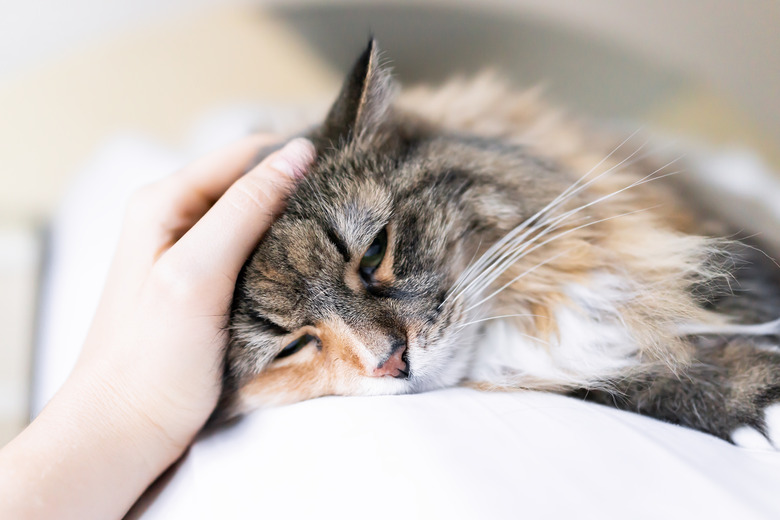What Are The Symptoms Of Cat Parvo?
There's nothing sadder and scarier than when your sweet, lovable cat suddenly becomes withdrawn and depressed and doesn't want to eat. We rely on our cats for companionship, amusement, and snuggling. When they hurt, we hurt.
Fewer U.S. households own cats than own dogs. However, cat people are more likely to own more than one cat than dog people are to own more than one dog. Cat people know that one is good, and two is better.
What is parvo in cats?
What is parvo in cats?
Parvo in cats is also referred to as feline distemper and feline panleukopenia. It's caused by a virus that kills cells that grow and divide quickly in your cat's body. This includes intestinal and bone marrow cells.
Cat parvo is very contagious. It thrives in all 50 states and most foreign countries. It's said that nearly all cats are exposed to it, directly or indirectly, at some point during their life.
How do cats get parvo?
How do cats get parvo?
Cats can get parvo directly from contact with another cat who has it. They can also get it from contact with an infected cat's urine, feces, and nose secretions. People who handle an infected cat or an infected cat's bedding, food, or water dish can carry the virus to the next cat they handle.
The parvo virus is tough. It can live for a year or longer in the environment an infected cat was once in. Not all typically available disinfectants can kill it.
Hot water, detergent, and bleach are recommended for sanitizing areas where an infected cat lived, but even then, there is no guarantee that you've completely eliminated it.
What are feline parvo symptoms?
What are feline parvo symptoms?
Symptoms of cat parvo include vomiting, diarrhea, lethargy, fever, and no appetite. Cats who are sick with parvo are often dehydrated. They may hang out near their water bowl but not drink.
If your cat has these symptoms, you should bring him to the vet as soon as possible. Your vet will want to know if your cat has been in contact with other cats. He will also ask if your cat has been vaccinated against parvo, and he will likely want to do a blood test.
If the blood test results show a low white blood cell count combined with the symptoms, he may suspect parvo. Feline parvo can be confirmed by checking your cat's stool for the virus.
How is feline parvo treated?
How is feline parvo treated?
There is no cure for the parvovirus in cats. Vets treat the symptoms until your cat is stronger and her own immune system can take over.
Treatment includes subcutaneous fluids to treat dehydration and antibiotics to help prevent infections. Fluids are given using a drip bag and needle stuck under the skin, usually at the base of the neck.
Antibiotics cannot kill the virus, but they're used because cats who are sick with parvo have a greater risk of developing a bacterial infection of some kind.
Why vaccinate against feline parvo?
Why vaccinate against feline parvo?
Since there is no cure for feline parvo, prevention is everything. The vaccine should first be given to kittens between six and eight weeks. Several boosters should follow every three to four weeks until they are 16 to 20 weeks old.
The vaccine schedule for adult cats is two doses that are three to four weeks apart. The feline parvo vaccine is usually bundled with other vaccines, like those for feline herpesvirus and feline calicivirus.
Even if you have a strictly indoor cat, it's wise to have him vaccinated. It only takes one contact with another cat who has parvo or sniffing his feces or urine to make your cat sick. You might not foresee your cat having this kind of contact, but you never know.
What are feline parvo outcomes?
What are feline parvo outcomes?
Feline parvo used to be a leading cause of cat death. Thanks to the preventive vaccine, this is no longer the case. However, once your cat gets parvo, survival rates are grim.
Adult cats who get parvo have a better chance of surviving than kittens. Cats who receive veterinary care for their parvo have a better chance of surviving than those who do not. Overall, up to 90 percent of cats who get parvo and are not treated will die.
Always check with your veterinarian before changing your pet's diet, medication, or physical activity routines. This information is not a substitute for a vet's opinion.
References
- American Society for the Prevention of Cruelty to Animals Prog: Feline Panleukopenia: Prevention, Management & Treatment
- American Veterinary Medical Association: Feline panleukopenia
- International Cat Care: Feline infectious enteritis (parvovirus, panleukopenia virus)
- Insurance Information Institute: Facts + Statistics: Pet Statistics
- WebMD: Pet Vaccines: Schedules for Cats and Dogs
- VIP Petcare: The 4 Vaccine Packages that Keep Your Cat Healthy
